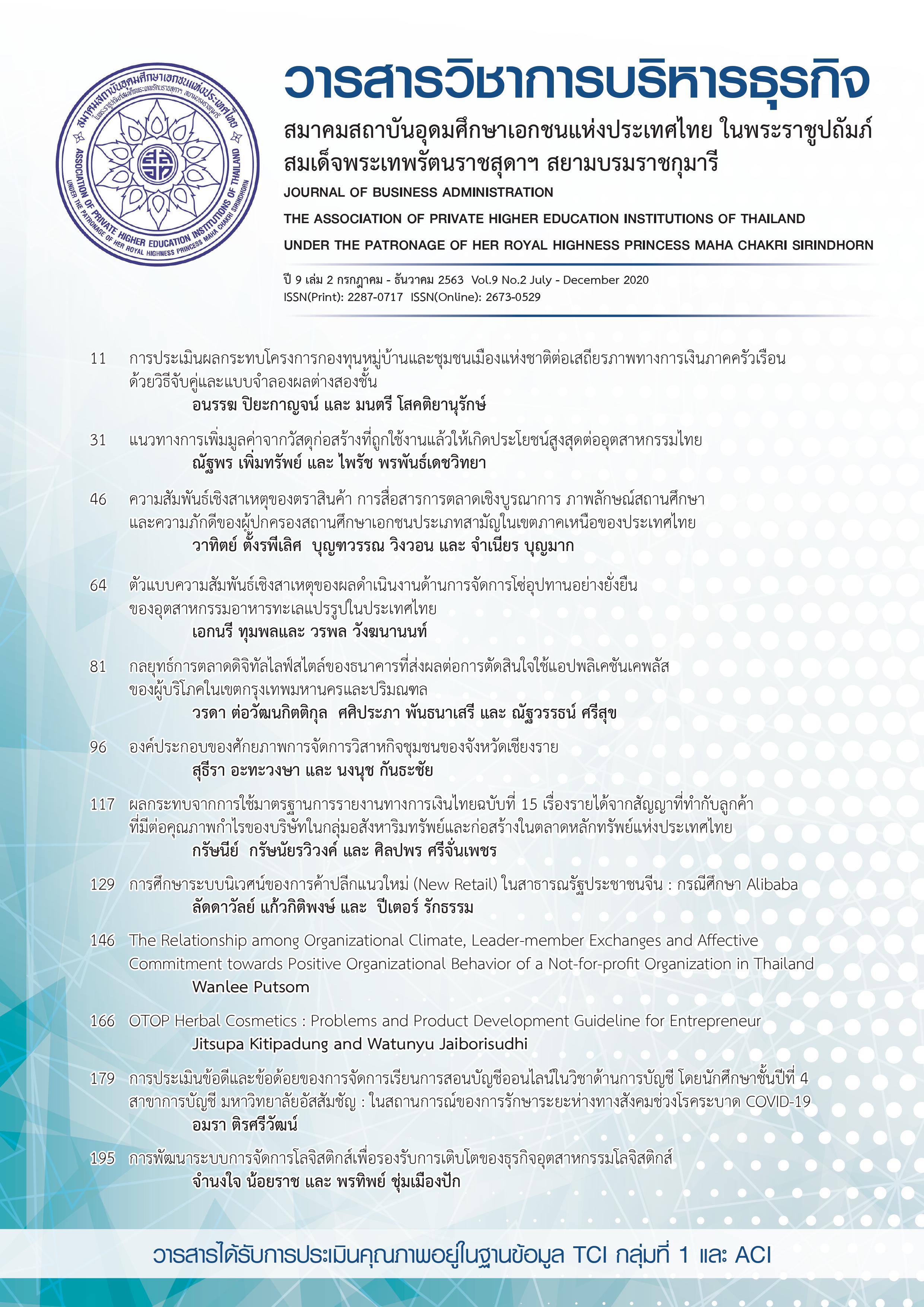การพัฒนาระบบการจัดการโลจิสติกส์ เพื่อรองรับการเติบโตของธุรกิจอุติสาหกรรมโลจิสติกส์
คำสำคัญ:
การพัฒนาระบบการจัดการโลจิสติกส์, อุตสาหกรรมโลจิสติกส์, แบบจำลองสมการโครงสร้างบทคัดย่อ
การวิจัยนี้มีวัตถุประสงค์เพื่อศึกษาการพัฒนาระบบการจัดการโลจิสติกส์เพื่อรองรับการเติบโตของธุรกิจอุตสาหกรรม
โลจิสติกส์ ดำเนินการวิจัยทั้งเชิงคุณภาพและเชิงปริมาณ สำรวจข้อมูลเชิงปริมาณจากแบบสอบถามผู้บริหารในองค์กรธุรกิจ
จำนวน 500 ราย โดยใช่้สถิติเชิงพรรณนา สถิติอ้างอิง และสถิติเชิงพหุผลการจัยพบว่า การจัดการโลจิสติกส์เพื่อรองรับ
การเติบโตของธุรกิจ อุตสาหกรรมโลจิสตกส์ที่มีค่าเฉลี่ยสูงที่สุดด้านการบริหารจัดการความสัมพันธ์กับลูกค้า ได้แก่ จัดให้องค์ความรู้
ทางด้านงานโลจิสติกส์แก่ลูกค้าในรูปแบบการอบรม ด้านนัการจัดการทรัพยากร ได้แก่ สรรหานักบริหารมืออาชีพด้านโลจิสติกสู์
เพื่อเพิ่มศักยภาพการบริหาร ด้านนัการบริหารจัดการข้อมูล ได้แก่ ใช้ระบบการจัดการฐานข้อมูลในองคก์กร (ERP) ในการเก็บข้อมูล
ทางด้านโลจิสติกส์เพื่อให้เกิดประสิทธิภาพ และด้านนวัตกรรมเทคโนโลยี ได้แก่ มีการรับชำระและจ่ายชำระด้วยระบบ
อินเตอร์เน็ต เช่น การโอนเงินทางมือถือ เป็นต้น สำหรับผลการทดสอบสมมติฐานพบว่า ธุรกิจอุตสาหรรมขนาดใหญ่กับธุรกิจ
ขนาดกลางและขนาดยอมให้ความสำคัญต่อการจัดการโลจิสติกส์เพื่อรองรับการเติบโตของธุรกิจอุตสาหกรรมโลจิสติกส์
ไม่แตกต่างกันอย่างมีนัยสำคัญทางสถิติที่ระดับ .05 ผลการวิเคราะห์ตัวแบบจำลองสมการโครงสร้างที่ได้พัฒนาขึ้นพบว่า
ผ่านตามเกณฑ์การประเมินมีความสอดคล้องกลมกลืนกับข้อมูลเชิงประจักษ์ โดยมีค่าระดับความน่าจะเป็นของไคสแควร์
เท่ากับ .078 ค่าไคสแควร์สัมพัทธ์ เท่ากับ 1.192 ค่าดัชนีวัดระดับความสอดคล้อง เท่ากับ .969 และค่าดัชนีรากของค่าเฉลี่ย
กำลังสองของการประมาณค่าความคลาดเคลื่อน เท่ากับ .020
ดาวน์โหลด
เผยแพร่แล้ว
รูปแบบการอ้างอิง
ฉบับ
ประเภทบทความ
สัญญาอนุญาต
บทความที่ลงตีพิมพ์ในวารสารวิชาการบริหารธุรกิจ สมาคมสถาบันอุดมศึกษาเอกชนแห่งประเทศไทยต้องเป็นบทความที่ไม่เคยได้รับการตีพิมพ์เผยแพร่ หรืออยู่ระหว่างการพิจารณาตีพิมพ์ในวารสารอื่นๆ การละเมิดลิขสิทธิ์เป็นความรับผิดชอบของผู้ส่งบทความโดยตรง


